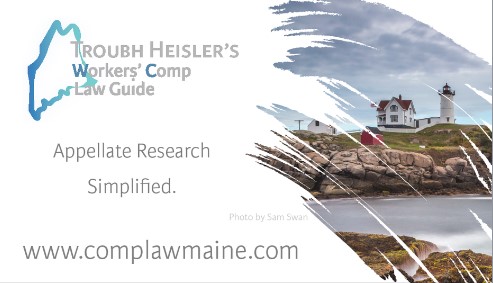Estate of Michael Boyle Sr. v. Lappin Brothers, Inc. – Where the ALJ left unresolved issues when denying the Estate’s Petition for Order of Payment seeking a ruling under 39-A M.R.S.A. 107 regarding Lappin Brothers obligation to pay its proportionate share of costs of collecting a third-party settlement, including reasonable attorney’s fees, the Appellate Division vacated and remanded the decision. In Estate of Michael Boyle, Sr. v. Lappin Brothers, Inc., Me. W.C.B. Dec. No. 23-18 (App. Div. 2023), 2019 decisions by the ALJ determined that Boyle had died due to mesothelioma resulting from workplace asbestos exposure. During the litigation the ALJ ordered Boyle to produce evidence of the cost of collection, Boyle declined or refused to do so. While granting the Petition for Award- Fatal for the purpose of finding a compensable death, the ALJ denied an award of death benefits under 39-A M.R.S.A. 215 because the Estate received third-party settlement proceeds which exceeded the amount of Lappin Brothers’ potential liability under the Act. The ALJ observed the “employer/insurers’ only obligation is to pay its proportionate share of the Estate’s cost of collection, including reasonable attorney’s fees”. Boyle did not seek further findings or appeal the denial of an award of death benefits.
Lappin made no payment of a proportionate share of costs of collection because the ALJ expressly denied the award of death benefits- the only relief available, and the decision did not order payment of any kind. Boyle filed the Petition for Order of Payment seeking an order of payment of a proportionate share of the costs of collection. The ALJ denied the petition ruling that an ALJ does not have jurisdiction to enforce its own decisions, the 2019 decree did not specifically order payment and the doctrine of res judicata prevented a determination of the proportionate share of the costs of collection. Boyle appealed arguing the ALJ erred on all three rulings.
The Appellate Division agreed with the ALJ that the power to enforce a decree rests exclusively with the Superior Court pursuant to 39-A M.R.S.A. 323. Despite the title of the petition and relief requested, the Appellate panel held the Petition for Order of Payment was more akin to a petition seeking clarification regarding the parties rights and responsibilities under 39-A M.R.S.A. 307. The panel pointed out that it has previously considered decisions where the ALJ resolved disputes regarding the meaning of prior decrees or dollar amounts of benefits awarded, even after the period for further findings or appeal has expired. There was no statutory barrier preventing the ALJ from resolving the post-decree dispute regarding the amount of the sec. 107 lien and the proportionate share of costs.
The panel rejected Lappin Brothers’ contention that res judicata bars litigation of the Estate’s sec. 107 rights under the 2019 decree. While recognizing that valid and final decisions of the Board are subject to the general rules of res judicata and issue preclusion, it went on to cite cases where res judicata was narrowly construed to preclude only issues actually litigated. For some reason, despite the record showing the parties litigated and argued the amount of the sec. 107 lien and proportionate share of costs, and that the a determination could not be reached due to Boyle’s continued failure or refusal to comply with the ALJ’s order to produce evidence of the costs of collection, the panel concluded the issue was not actually litigated. Further, because the Estate requested additional findings regarding the amount of the lien and proportionate share of the cost of collection, and the petition was not barred by res judicata, the Appellate Division vacated the decision and remanded for additional findings.
To view this decision, click here.
If you have any questions about this case or any other workers’ compensation matter, please let us know.

